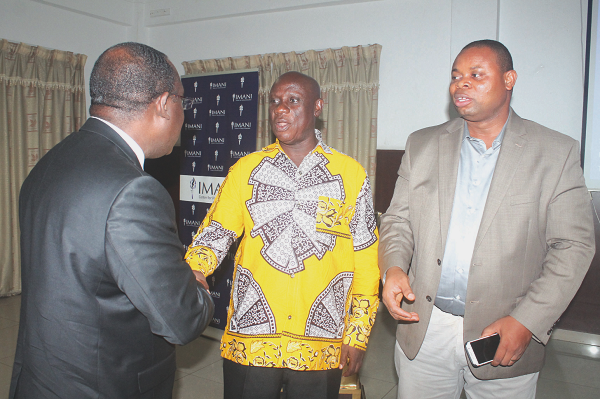
MMDAs up by 232.3 per cent since 1992
A report by the IMANI Centre for Policy and Education, a policy think tank, has revealed a 232.3 per cent increase in the number of Ghana’s metropolitan, municipal and district assemblies (MMDAs), and a 37 per cent increase in the number of constituencies since 1992.
The increases, which are due to new creations, have, however, not been in line with laid-out laws or considered governance policy objectives.
The report, titled: Proliferation of new districts and constituencies in Ghana: The mismatch between policy objectives, outcomes and impacts, was undertaken in collaboration with Odekro, a civil society group championing better citizen engagement with Parliament.
The two bodies were supported by STAR Ghana and the report was launched in Accra yesterday (May 30, 2018).
Report
Researchers of the report, Ms Constance Ababio and Ms Keshia Osei-Kufuor, both of IMANI, and Mr Ernest Nii Armah Ashitey of Odekro, while presenting highlights, explained that the controversies around the creation of new constituencies since 2004 by the Electoral Commission (EC), with accusations that the government usually embarked on the creation of districts for political reasons rather than development goals, had led to the study.
Another reason was that the creation of districts and constituencies were most often in breach of constitutional provisions in Article 241(2) and the Local Government Act 2016, Act 936, that proposed a census before such decisions.
The researchers, therefore, analysed the policies used by the EC in demarcating constituencies since 2004, analysed the relationship between the creation of new districts and whether that led to improved governance and development and assessed the performance of the members of Parliament (MPs) of the newly created constituencies.
In assessing their performance, they analysed the key roles of MPs, that is oversight, legislation and representation.
EC pressured
With the creation of new constituencies, the analyses revealed that most often, the EC was pushed into the creation of constituencies because the executive had created new districts.
The results of the analyses also showed that while internally generated funds (IGF) of a district had a positive impact on the development of the same, the District Assemblies Common Fact (DACF) had a negative impact as it was just depended on greatly to support service delivery, but did not facilitate local economic growth and development.
For the performance of MPs in newly created constituencies, it was found that their performance was based on their personalities and the rules of engagement in Parliament.
Scrap MPs fund
Among the recommendations, the researchers proposed the scrapping of the MPs Common Fund as their functions did not require that. They also recommended that the creation of districts and demarcation of constituencies should be as transparent as possible and published by the Ministry of Local Government and Rural Development (MLGRD) in the case of the creation of districts and by the EC in the case of the creation of constituencies.
The researchers were of the view that the EC should not be forced to create new constituencies when districts were politically created, that is to serve political goals and not by laid-down rules in the laws.
A lively debate ensued after the presentation, with the Vice-President of IMANI, Mr Kofi Bentil, proposing that the country ought to admit that its model of decentralisation needed to be tweaked.
He also proposed that the government and policy makers ought to have the boldness to review created districts that were not viable by merging them up.
However, the Deputy General Secretary of the New Patriotic Party (NPP), Mr Obiri Boahene, was of the view that that would be politically suicidal.
The Chief Executive of IMANI, Mr Franklin Cudjoe, promised further engagements on the findings with other partners to disseminate the results.
